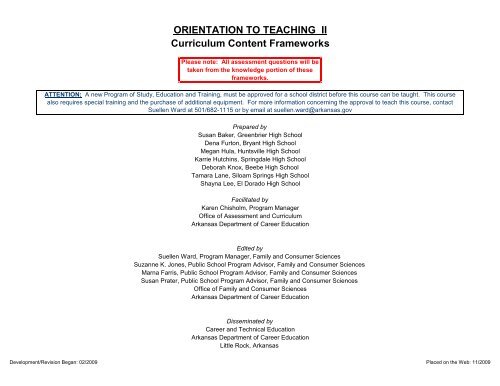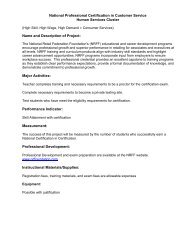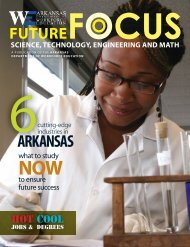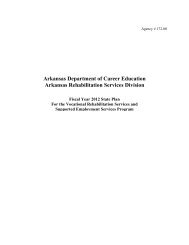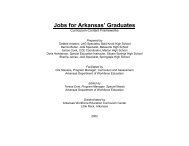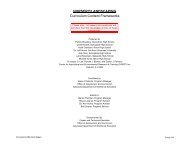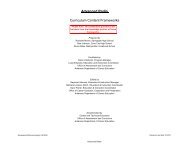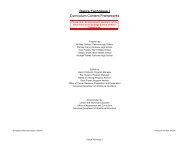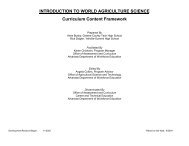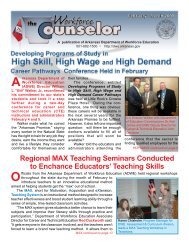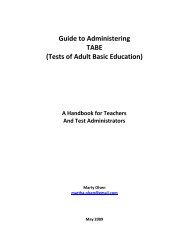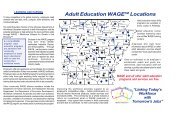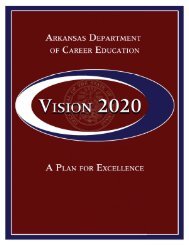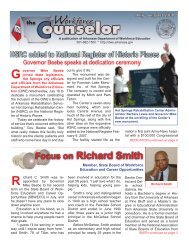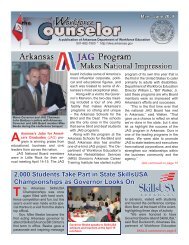Orientation to Teaching II - Arkansas Department of Career Education
Orientation to Teaching II - Arkansas Department of Career Education
Orientation to Teaching II - Arkansas Department of Career Education
You also want an ePaper? Increase the reach of your titles
YUMPU automatically turns print PDFs into web optimized ePapers that Google loves.
ORIENTATION TO TEACHING <strong>II</strong><br />
Curriculum Content Frameworks<br />
Please note: All assessment questions will be<br />
taken from the knowledge portion <strong>of</strong> these<br />
frameworks.<br />
ATTENTION: A new Program <strong>of</strong> Study, <strong>Education</strong> and Training, must be approved for a school district before this course can be taught. This course<br />
also requires special training and the purchase <strong>of</strong> additional equipment. For more information concerning the approval <strong>to</strong> teach this course, contact<br />
Suellen Ward at 501/682-1115 or by email at suellen.ward@arkansas.gov<br />
Prepared by<br />
Susan Baker, Greenbrier High School<br />
Dena Fur<strong>to</strong>n, Bryant High School<br />
Megan Hula, Huntsville High School<br />
Karrie Hutchins, Springdale High School<br />
Deborah Knox, Beebe High School<br />
Tamara Lane, Siloam Springs High School<br />
Shayna Lee, El Dorado High School<br />
Facilitated by<br />
Karen Chisholm, Program Manager<br />
Office <strong>of</strong> Assessment and Curriculum<br />
<strong>Arkansas</strong> <strong>Department</strong> <strong>of</strong> <strong>Career</strong> <strong>Education</strong><br />
Edited by<br />
Suellen Ward, Program Manager, Family and Consumer Sciences<br />
Suzanne K. Jones, Public School Program Advisor, Family and Consumer Sciences<br />
Marna Farris, Public School Program Advisor, Family and Consumer Sciences<br />
Susan Prater, Public School Program Advisor, Family and Consumer Sciences<br />
Office <strong>of</strong> Family and Consumer Sciences<br />
<strong>Arkansas</strong> <strong>Department</strong> <strong>of</strong> <strong>Career</strong> <strong>Education</strong><br />
Disseminated by<br />
<strong>Career</strong> and Technical <strong>Education</strong><br />
<strong>Arkansas</strong> <strong>Department</strong> <strong>of</strong> <strong>Career</strong> <strong>Education</strong><br />
Little Rock, <strong>Arkansas</strong><br />
Development/Revision Began: 02/2009<br />
Placed on the Web: 11/2009
Curriculum Content Frameworks<br />
Grade Levels: 11, 12<br />
Course Code: 493290<br />
ORIENTATION TO TEACHING <strong>II</strong><br />
Prerequisite: <strong>Orientation</strong> <strong>to</strong> <strong>Teaching</strong> I<br />
Course Description: <strong>Orientation</strong> <strong>to</strong> <strong>Teaching</strong> <strong>II</strong> is a course designed <strong>to</strong> integrate psychological, sociological, and philosophical foundations which prepare students for positive<br />
field experiences. This course encourages prospective teachers <strong>to</strong> become responsible, pr<strong>of</strong>essional, and ethical as they explore the teaching pr<strong>of</strong>ession. The students will<br />
research and examine foundations within the educational system. Upon completion <strong>of</strong> this course, a student should have a working knowledge <strong>of</strong> and employability skills for<br />
the education pr<strong>of</strong>ession. The student will have the opportunity <strong>to</strong> obtain the parapr<strong>of</strong>essional certification.<br />
Table <strong>of</strong> Contents<br />
Page<br />
Unit 1: Foundations <strong>of</strong> <strong>Education</strong><br />
3<br />
Unit 2: Philosophy <strong>of</strong> <strong>Education</strong><br />
4<br />
Unit 3: Ethics and Legal Responsibility<br />
5<br />
Unit 4: Classroom Management and Organization<br />
7<br />
Unit 5: Teacher Pr<strong>of</strong>essionalism<br />
8<br />
Unit 6: Practicum<br />
10<br />
Glossary<br />
11<br />
<strong>Orientation</strong> <strong>to</strong> <strong>Teaching</strong> <strong>II</strong><br />
2
Unit 1: Foundations <strong>of</strong> <strong>Education</strong><br />
Hours: 10<br />
Terminology: Amendment, Separate But Equal, Title I, Title IX<br />
Knowledge<br />
CAREER and TECHNICAL SKILLS<br />
What the Student Should be Able <strong>to</strong> Do<br />
Application<br />
ACADEMIC and WORKPLACE SKILLS<br />
What the Instruction Should Reinforce<br />
Skill Group Skill Description<br />
1.1 Define terms related <strong>to</strong> 1.1.1 Demonstrate knowledge <strong>of</strong> terms Foundation Reading<br />
foundations <strong>of</strong> education<br />
Writing<br />
1.2 Examine significant legal issues 1.2.1 Compare and contrast significant legal Foundation Reading<br />
in education<br />
• Brown vs. Board <strong>of</strong> <strong>Education</strong><br />
1954<br />
1.2.2<br />
issues in education<br />
Explain how legal issues have impacted<br />
Writing<br />
• Central High 1957<br />
• Family Rights and Privacy Act<br />
<strong>of</strong> 1974<br />
education <strong>to</strong>day<br />
Thinking<br />
Reasoning<br />
• Title I 1965<br />
• Title IX 1972<br />
Analyzes and applies what has been read <strong>to</strong> a<br />
specific task [1.3.2]<br />
Communicates thoughts, ideas, or facts in written<br />
form in a clear, concise manner [1.6.6]<br />
Analyzes and applies what has been read <strong>to</strong> a<br />
specific task [1.3.2]<br />
Analyzes data, summarizes results, and makes<br />
conclusions [1.6.2]<br />
Uses logic <strong>to</strong> draw conclusions from available<br />
information [4.5.6]<br />
<strong>Orientation</strong> <strong>to</strong> <strong>Teaching</strong> <strong>II</strong><br />
3
Unit 2: Philosophy <strong>of</strong> <strong>Education</strong><br />
Hours: 10<br />
Terminology: Deficiency needs, Essentialism, Hierarchy, Idealism, Logic, Philosophy, Philosophy <strong>of</strong> education, Realism, Schema, Self-actualization, Sociological, Theory<br />
CAREER and TECHNICAL SKILLS<br />
What the Student Should be Able <strong>to</strong> Do<br />
ACADEMIC and WORKPLACE SKILLS<br />
What the Instruction Should Reinforce<br />
Knowledge<br />
Application<br />
Skill Group<br />
Skill<br />
Description<br />
2.1 Define terms related <strong>to</strong> 2.1.1 Demonstrate knowledge <strong>of</strong> terms Foundation Reading<br />
philosophy <strong>of</strong> education<br />
Writing<br />
2.2 Identify major educational<br />
philosophers<br />
2.2.1 Explain each philosopher's contributions <strong>to</strong> Foundation<br />
education<br />
Listening<br />
• Dewey<br />
Reading<br />
• Erickson<br />
2.2.2 Use major educational philosophies <strong>to</strong><br />
• Kohlberg<br />
create a personal philosophy <strong>of</strong> education<br />
• Maslow<br />
• Montessori<br />
• Piaget<br />
• Vygotsky<br />
Speaking<br />
Writing<br />
Applies/Understands technical words that pertain<br />
<strong>to</strong> the characteristics <strong>of</strong> learners [1.3.6]<br />
Applies/Uses technical words and concepts [1.6.4]<br />
Receives and interprets verbal messages [1.2.8]<br />
Comprehends written information for main ideas<br />
[1.3.7]<br />
Draws conclusions from what is read [1.3.12]<br />
Uses written resources <strong>to</strong> obtain factual<br />
information [1.3.23]<br />
Communicates a thought, idea, or fact in spoken<br />
form [1.5.5]<br />
Organizes information in<strong>to</strong> an appropriate format<br />
[1.6.10]<br />
Thinking<br />
Creative Thinking Uses imagination <strong>to</strong> create something new [4.1.1]<br />
<strong>Orientation</strong> <strong>to</strong> <strong>Teaching</strong> <strong>II</strong><br />
4
Unit 3: Ethics and Legal Responsibility<br />
Hours: 10<br />
Terminology: Copyright laws, Fair Use Guidelines, Family <strong>Education</strong>al Rights and Privacy Act (FERPA), Freedom <strong>of</strong> Information Act, Grievance, Negligence, Plagiarism, Reduction in force<br />
CAREER and TECHNICAL SKILLS<br />
What the Student Should be Able <strong>to</strong> Do<br />
ACADEMIC and WORKPLACE SKILLS<br />
What the Instruction Should Reinforce<br />
Knowledge<br />
Application<br />
Skill Group<br />
Skill<br />
Description<br />
3.1 Define terms related <strong>to</strong> ethics 3.1.3 Demonstrate knowledge <strong>of</strong> terms Foundation Listening<br />
and legal responsibility<br />
Reading<br />
Comprehends ideas and concepts related <strong>to</strong><br />
ethics and legal responsibility [1.2.1]<br />
Comprehends written information for main ideas<br />
[1.3.7]<br />
3.2 Examine ethical and legal 3.2.1<br />
responsibilities <strong>of</strong> educa<strong>to</strong>rs<br />
• Copyright/plagiarism<br />
• Fair Use Guidelines<br />
• FERPA<br />
• Freedom <strong>of</strong> Information Act<br />
• Teacher liability<br />
• Code <strong>of</strong> Ethics<br />
Analyze how each <strong>of</strong> the legal<br />
responsibilities impacts the teacher's<br />
behavior<br />
Foundation<br />
Writing<br />
Listening<br />
Reading<br />
Speaking<br />
Writing<br />
Applies/Uses technical words and concepts<br />
[1.6.4]<br />
Listens for content [1.2.3]<br />
Comprehends written information for main ideas<br />
[1.3.7]<br />
Communicates a thought, idea, or fact in spoken<br />
form [1.5.5]<br />
Organizes information in<strong>to</strong> an appropriate format<br />
[1.6.10]<br />
Personal<br />
Management<br />
Integrity/Honesty/<br />
Work Ethic<br />
Describes/Explains significance <strong>of</strong> integrity,<br />
honesty, and work ethics [3.2.4]<br />
Organizational<br />
Effectiveness<br />
Applies knowledge <strong>to</strong> implement work-related<br />
system or practice [3.3.4]<br />
Thinking<br />
Reasoning<br />
Comprehends ideas and concepts related <strong>to</strong><br />
ethics and legal responsibility [4.5.2]<br />
<strong>Orientation</strong> <strong>to</strong> <strong>Teaching</strong> <strong>II</strong><br />
5
CAREER and TECHNICAL SKILLS<br />
What the Student Should be Able <strong>to</strong> Do<br />
ACADEMIC and WORKPLACE SKILLS<br />
What the Instruction Should Reinforce<br />
Knowledge<br />
Application<br />
Skill Group<br />
Skill<br />
Description<br />
3.3 Identify negative teacher 3.3.1 Examine the effect that negative teacher Foundation Writing<br />
behaviors in the classroom<br />
behaviors may have on stakeholders<br />
Organizes information in<strong>to</strong> an appropriate format<br />
[1.6.10]<br />
3.3.2<br />
Review the process in filing a grievance<br />
against a teacher<br />
Personal<br />
Management<br />
Integrity/Honesty/<br />
Work Ethic<br />
Follows established rules, regulations, and<br />
policies [3.2.5]<br />
3.3.3<br />
Discuss ethics, legal rights, and<br />
responsibilities <strong>of</strong> teachers <strong>to</strong> stakeholders<br />
Responsibility<br />
Comprehends ideas and concepts related <strong>to</strong><br />
ethics and legal responsibility [3.4.2]<br />
Sets high standards for self in completion <strong>of</strong> a<br />
task [3.4.9]<br />
Self-Esteem<br />
Develops/Initiates a plan for self improvement<br />
[3.5.4]<br />
Presents positive image <strong>of</strong> personal attitudes and<br />
abilities [3.5.7]<br />
Thinking<br />
Knowing How <strong>to</strong><br />
Learn<br />
Processes new information as related <strong>to</strong> the<br />
workplace [4.3.5]<br />
<strong>Orientation</strong> <strong>to</strong> <strong>Teaching</strong> <strong>II</strong><br />
6
Unit 4: Classroom Management and Organization<br />
Hours: 10<br />
Terminology: Assertive discipline, Bell-<strong>to</strong>-bell instruction, Expulsion, Guidance, Student engagement, Suspension<br />
CAREER and TECHNICAL SKILLS<br />
What the Student Should be Able <strong>to</strong> Do<br />
ACADEMIC and WORKPLACE SKILLS<br />
What the Instruction Should Reinforce<br />
Knowledge<br />
Application<br />
Skill Group<br />
Skill<br />
Description<br />
4.1 Define terms related <strong>to</strong> 4.1.1 Demonstrate knowledge <strong>of</strong> terms Foundation Reading<br />
classroom management and<br />
organization<br />
Writing<br />
4.2 Identify current classroom 4.2.1 Compare and contrast classroom<br />
Foundation Listening<br />
management authorities<br />
management authorities<br />
• Wong<br />
• Canter 4.2.2 Compile a list <strong>of</strong> classroom management<br />
Reading<br />
• Marzano<br />
techniques<br />
• Pickering<br />
Speaking<br />
4.2.3 Create classroom management procedures<br />
for a course<br />
Writing<br />
Analyzes and applies what has been read <strong>to</strong><br />
specific task [1.3.2]<br />
Takes notes from various sources [1.6.18]<br />
Receives and interprets verbal messages [1.2.8]<br />
[1.2.2]<br />
Distinguishes between fact and opinion [1.3.11]<br />
Asks questions <strong>to</strong> clarify information [1.5.3]<br />
Asks questions <strong>to</strong> obtain information [1.5.4]<br />
Analyzes data, summarizes results, and makes<br />
conclusions [1.6.2]<br />
Records data [1.6.16]<br />
Personal<br />
Management<br />
Integrity/Honesty/<br />
Work Ethic<br />
Describes desirable worker characteristics [3.2.3]<br />
Thinking<br />
Creative Thinking<br />
4.3 Name consequences <strong>of</strong> positive 4.3.1 Inspect student handbooks at various grade Foundation Reading<br />
and negative classroom<br />
levels (elementary, middle, junior, and high<br />
behavior<br />
schools)<br />
4.3.2 Correlate different perspectives on Thinking Reasoning<br />
classroom management procedures (4.2)<br />
with student handbooks<br />
Finds new ways <strong>of</strong> dealing with existing<br />
problems/situations [4.1.5]<br />
Locates pertinent information in documents such<br />
as materials, graphs, and schedules <strong>to</strong> perform<br />
tasks [1.3.18]<br />
Comprehends ideas and concepts related <strong>to</strong><br />
classroom management and organization [4.5.2]<br />
<strong>Orientation</strong> <strong>to</strong> <strong>Teaching</strong> <strong>II</strong><br />
7
Unit 5: Teacher Pr<strong>of</strong>essionalism<br />
Hours: 20<br />
Terminology: Credentials file, Formative evaluation, Highly qualified teacher, Men<strong>to</strong>rs, Merit pay, National Board Certification, Parapr<strong>of</strong>essional exam, Performance pay, Pr<strong>of</strong>essional<br />
development, Pr<strong>of</strong>essional growth plan, Pr<strong>of</strong>essionalism, Summative evaluation, Teacher improvement plan<br />
CAREER and TECHNICAL SKILLS<br />
What the Student Should be Able <strong>to</strong> Do<br />
ACADEMIC and WORKPLACE SKILLS<br />
What the Instruction Should Reinforce<br />
Knowledge<br />
Application Skill Group Skill<br />
Description<br />
5.1 Define terms related <strong>to</strong> teacher 5.1.1 Demonstrate knowledge <strong>of</strong> terms Foundation Reading<br />
pr<strong>of</strong>essionalism<br />
Speaking<br />
Follows written directions [1.3.13]<br />
Speaks effectively using appropriate eye contact,<br />
gestures, and posture [1.5.1]<br />
Personal<br />
Management<br />
Self-Esteem<br />
Creates a positive self-image by selling self in a<br />
letter <strong>of</strong> application [3.5.2]<br />
5.2 List items that should be part <strong>of</strong> 5.2.1 Develop a credentials file<br />
Foundation Writing<br />
a credentials file<br />
• Transcript<br />
• Letter <strong>of</strong> application<br />
Personal<br />
Self-Esteem<br />
• Resume´<br />
Management<br />
• Letters <strong>of</strong> recommendation<br />
• Parapr<strong>of</strong>essional test score (students who<br />
are 18+)<br />
5.3 Examine the four domains <strong>of</strong> the 5.3.1 Outline the components <strong>of</strong> the Praxis Foundation Reading<br />
Praxis<br />
• Domain A - Organizing content 5.3.2<br />
knowledge for student learning<br />
• Domain B - Creating an<br />
environment for student learning<br />
• Domain C - <strong>Teaching</strong> for<br />
student learning<br />
• Domain D - Teacher<br />
pr<strong>of</strong>essionalism<br />
List the steps in the certification process<br />
• Praxis I<br />
• Praxis <strong>II</strong><br />
• Praxis <strong>II</strong>I<br />
Speaking<br />
Presents positive image <strong>of</strong> personal attitudes and<br />
abilities [3.5.7]<br />
Completes form accurately [1.6.7]<br />
Creates a positive self-image by selling self in a<br />
letter <strong>of</strong> application [3.5.2]<br />
Applies information <strong>to</strong> job performance [1.3.4]<br />
Applies information <strong>to</strong> new situations [1.3.5]<br />
Organizes ideas and communicates oral<br />
messages <strong>to</strong> listeners [1.5.7]<br />
<strong>Orientation</strong> <strong>to</strong> <strong>Teaching</strong> <strong>II</strong><br />
8
CAREER and TECHNICAL SKILLS<br />
What the Student Should be Able <strong>to</strong> Do<br />
ACADEMIC and WORKPLACE SKILLS<br />
What the Instruction Should Reinforce<br />
Knowledge<br />
Application Skill Group Skill Description<br />
5.4 List opportunities for higher 5.4.1 Identify steps <strong>of</strong> National Board Certification Foundation Writing<br />
levels <strong>of</strong> certification<br />
Communicates thoughts, ideas, or facts in written<br />
form in a clear, concise manner [1.6.6]<br />
5.4.2<br />
Explain benefits <strong>of</strong> pursuing higher levels <strong>of</strong><br />
certification<br />
Organizes information in<strong>to</strong> an appropriate format<br />
[1.6.10]<br />
Writes appropriate entries [1.6.22]<br />
Interpersonal<br />
Leadership<br />
Directs individuals in the performance <strong>of</strong> a specific<br />
task [2.4.5]<br />
Personal<br />
Management<br />
Integrity/Honesty/<br />
Work Ethic<br />
Follows established rules, regulations, and<br />
policies [3.2.5]<br />
Responsibility<br />
Self-Esteem<br />
Accepts responsibility for position [3.4.1]<br />
Presents positive image <strong>of</strong> personal attitudes and<br />
abilities [3.5.7]<br />
Thinking<br />
Knowing How <strong>to</strong><br />
Learn<br />
Uses available resources <strong>to</strong> acquire new skills or<br />
improve skills [4.3.4]<br />
<strong>Orientation</strong> <strong>to</strong> <strong>Teaching</strong> <strong>II</strong><br />
9
Unit 6: Practicum<br />
Hours: 60<br />
Terminology: Best practices, Pacing guide, Practicum, Standards<br />
CAREER and TECHNICAL SKILLS<br />
What the Student Should be Able <strong>to</strong> Do<br />
ACADEMIC and WORKPLACE SKILLS<br />
What the Instruction Should Reinforce<br />
Knowledge<br />
Application Skill Group<br />
Skill Description<br />
6.1 Define terms related <strong>to</strong> the 6.1.1 Demonstrate knowledge <strong>of</strong> terms Foundation Reading<br />
practicum experience<br />
Applies information and concepts derived from<br />
printed materials [1.3.3]<br />
Identifies relevant details, facts, and specifications<br />
[1.1.16]<br />
Writing<br />
Analyzes data, summarizes results, and makes<br />
conclusions [1.6.2]<br />
Thinking<br />
Creative Thinking<br />
Prepares presentation based on subject research,<br />
interviews, surveys [4.1.10]<br />
Reasoning<br />
6.2 Develop knowledge <strong>of</strong><br />
6.2.1 Participate in teaching at various grade and Foundation Reading<br />
classroom learning<br />
subject levels (students should participate in<br />
at least three different grade levels and/or<br />
subject areas)<br />
Writing<br />
Sees relationship between two or more ideas,<br />
objects, or situations [4.5.5]<br />
Uses written resources (books, dictionaries,<br />
direc<strong>to</strong>ries) <strong>to</strong> obtain factual information<br />
[1.3.23]<br />
Analyzes data, summarizes results, and makes<br />
conclusions [1.6.2]<br />
Thinking Reasoning Sees relationship between two or more ideas,<br />
objects, or situations [4.5.5]<br />
<strong>Orientation</strong> <strong>to</strong> <strong>Teaching</strong> <strong>II</strong><br />
10
1. Amendment – the process <strong>of</strong> changing a document <strong>to</strong> improve or clarify the intention or meaning<br />
2.<br />
Glossary<br />
Unit 1: Foundations <strong>of</strong> <strong>Education</strong><br />
Separate But Equal – a policy <strong>of</strong> segregating minorities in education, transportation, housing, and other areas <strong>of</strong> public life if other opportunities were considered equal <strong>to</strong><br />
those <strong>of</strong> non–minorities. In education, the policy was evidenced by separate schools with different curricula, teaching methods, and opportunities.<br />
3. Title I – a federal compensa<strong>to</strong>ry education program that funds supplemental education services for low-income students in elementary and secondary schools<br />
4. Title IX – a federal act providing for equal athletic opportunities regardless <strong>of</strong> gender<br />
<strong>Orientation</strong> <strong>to</strong> <strong>Teaching</strong> <strong>II</strong><br />
11
1.<br />
Unit 2: Philosophy <strong>of</strong> <strong>Education</strong><br />
Deficiency needs – in Maslow's hierarchy <strong>of</strong> needs, those needs that are critical <strong>to</strong> a person's well being and that must be satisfied first and foremost. These include physiological<br />
needs, safety and security, love and belonging, self-worth and self-esteem, and self-actualization.<br />
2.<br />
Essentialism – an educational philosophy that emphasizes a core body <strong>of</strong> knowledge and skills necessary for effective participation in society. Proponents believe that an educated<br />
person must have this core <strong>of</strong> knowledge and skills, and that it should be taught <strong>to</strong> all children.<br />
3. Hierarchy – an order <strong>of</strong> rank<br />
4. Idealism – a traditional philosophy asserting that ideas are the only reliable form <strong>of</strong> reality<br />
5. Logic – the branch <strong>of</strong> philosophy that examines the processes <strong>of</strong> deriving valid conclusions from basic principles<br />
6. Philosophy – the study <strong>of</strong> theories <strong>of</strong> knowledge, truth, existence, and morality<br />
7. Philosophy <strong>of</strong> education – a personal credo that identifies an individual's beliefs about education and, more specifically, about the act <strong>of</strong> teaching<br />
8. Realism – a traditional philosophy suggesting that the features <strong>of</strong> the universe exist whether or not a human being is there <strong>to</strong> perceive them<br />
9. Schema – cognitive structures<br />
10. Self–actualization – the state <strong>of</strong> having become everything a person is capable <strong>of</strong> becoming; realizing one's full potential, capacities, and talents<br />
11. Sociological – related <strong>to</strong> the study <strong>of</strong> human social behavior and the institutions <strong>of</strong> a society<br />
12. Theory – a set <strong>of</strong> related principles that are based on observation and are used <strong>to</strong> explain additional observations<br />
<strong>Orientation</strong> <strong>to</strong> <strong>Teaching</strong> <strong>II</strong><br />
12
1.<br />
Unit 3: Ethics and Legal Responsibility<br />
Copyright laws – the exclusive right <strong>of</strong> the author or crea<strong>to</strong>r <strong>of</strong> a literary or artistic property (such as a book, movie, or musical composition) <strong>to</strong> print, copy, sell, license, distribute,<br />
transform <strong>to</strong> another medium, translate, record, perform, or otherwise use (or not use) their work, and <strong>to</strong> give it <strong>to</strong> another by will<br />
2. Fair Use Guidelines – policies that specify limitations in the use <strong>of</strong> copyrighted materials for educational purposes<br />
3.<br />
Family <strong>Education</strong>al Rights and Privacy Act (FERPA) – a federal law that protects the privacy <strong>of</strong> student education records and requires institutions <strong>to</strong> adhere strictly <strong>to</strong> the<br />
guidelines governing students' rights regarding the release <strong>of</strong> student records<br />
4. Freedom <strong>of</strong> Information Act – a law ensuring public access <strong>to</strong> U.S. government records<br />
5. Grievance – a formal complaint against an employer or teacher alleging unsatisfac<strong>to</strong>ry working conditions or unsatisfac<strong>to</strong>ry performance<br />
6.<br />
Negligence – a teacher's or other school employee's failure <strong>to</strong> exercise sufficient care in protecting students from injury<br />
7. Plagiarism – representing the writings, literary concepts (plot, characters, words), or other original work <strong>of</strong> another as one's own product<br />
8. Reduction in force – the elimination <strong>of</strong> teaching positions in a school system because <strong>of</strong> declining student population or funding<br />
<strong>Orientation</strong> <strong>to</strong> <strong>Teaching</strong> <strong>II</strong><br />
13
Unit 4: Classroom Management and Organization<br />
1. Assertive discipline – a structured, systematic approach designed <strong>to</strong> assist educa<strong>to</strong>rs in running an organized, teacher-in-charge, classroom environment<br />
2. Bell-<strong>to</strong>-bell instruction – teaching from the tardy bell <strong>to</strong> the dismissal bell with limited down time<br />
3. Expulsion – removing a child from the school setting for an extended period <strong>of</strong> time<br />
4. Guidance – advice or counseling provided for students in preparing for a course <strong>of</strong> study<br />
5. Student engagement – when students are involved in the learning process<br />
6. Suspension – denial <strong>of</strong> a student's privilege <strong>to</strong> attend school and school activities for a specified period <strong>of</strong> time<br />
<strong>Orientation</strong> <strong>to</strong> <strong>Teaching</strong> <strong>II</strong><br />
14
1.<br />
Unit 5: Teacher Pr<strong>of</strong>essionalism<br />
Credentials file – a collection <strong>of</strong> materials used <strong>to</strong> support the search for post-baccalaureate employment or admission <strong>to</strong> graduate or pr<strong>of</strong>essional school. The file generally<br />
consists <strong>of</strong> a resume´, un<strong>of</strong>ficial transcript, and letters <strong>of</strong> recommendation.<br />
2. Formative evaluation – a method <strong>of</strong> validating that the goals <strong>of</strong> instruction are being achieved and <strong>of</strong> ensuring improved instruction<br />
3. Highly qualified teacher – a teacher who has been licensed (via traditional or alternative routes) and has demonstrated a high level <strong>of</strong> competence in the subjects that he or she teaches<br />
4. Men<strong>to</strong>rs – experienced teachers who provide guidance and support for beginning teachers<br />
5. Merit pay – a supplement <strong>to</strong> a teacher's base salary intended <strong>to</strong> reward superior performance or work in a high-need area<br />
6. National Board Certification – recognition <strong>of</strong> highly accomplished educa<strong>to</strong>rs who have proven their instructional achievements through a defined, rigorous process<br />
7. Parapr<strong>of</strong>essional exam – an exam which allows a person <strong>to</strong> obtain employment as a teacher's aide<br />
8. Performance pay – a financial reward given <strong>to</strong> teachers based on the special quality <strong>of</strong> their work<br />
9. Pr<strong>of</strong>essional development – the process <strong>of</strong> advancing knowledge and enhancing pr<strong>of</strong>essional practice through continuing education efforts such as district workshops<br />
10. Pr<strong>of</strong>essional growth plan – a structured plan for improving one's educational practices<br />
11. Pr<strong>of</strong>essionalism – the ethical behavior exhibited by teachers<br />
12. Summative evaluation – the process <strong>of</strong> gathering information about a teacher's competence, <strong>of</strong>ten for the purpose <strong>of</strong> making administrative decisions about retention and promotion<br />
13. Teacher improvement plan – a plan designed <strong>to</strong> provide support through communication, discussion, and collaboration in the area(s) <strong>of</strong> significant concern<br />
<strong>Orientation</strong> <strong>to</strong> <strong>Teaching</strong> <strong>II</strong><br />
15
Unit 6: Practicum<br />
1. Best practices – researched teaching strategies designed <strong>to</strong> improve student performance<br />
2. Pacing guide – a detailed course outline that is designed <strong>to</strong> promote continuity throughout the curriculum<br />
3. Practicum – the part <strong>of</strong> a course consisting <strong>of</strong> practical work in a particular field<br />
4. Standards – statements specifying what students should know and what skills they should have upon completing an area <strong>of</strong> study<br />
<strong>Orientation</strong> <strong>to</strong> <strong>Teaching</strong> <strong>II</strong><br />
16


